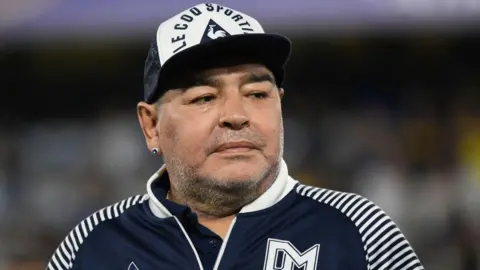In a significant turn of events in the ongoing trial surrounding Diego Maradona’s medical team, Judge Julieta Makintach has announced her decision to step down after facing criticism for her involvement in a documentary related to the case. This development emerged following accusations from prosecutor Patricio Ferrari who claimed that Judge Makintach was behaving “like an actress and not a judge,” thus raising concerns about her impartiality in the proceedings. The trial, which involves seven medical professionals charged with negligent homicide in connection to the football legend’s death in November 2020, has now been adjourned, casting uncertainty over its future. A ruling on whether to order a new trial is expected on Thursday.
Diego Maradona, celebrated as one of football’s all-time greats, passed away from a heart attack at the age of 60 while recovering at his home in Buenos Aires after brain surgery. Prosecutors allege that elements of negligence in the care he received amounted to “reckless, deficient and unprecedented” medical practices, asserting that Maradona’s death was preventable. The accused medical staff includes a neurosurgeon, a doctor, and a night nurse, all of whom deny the charges and argue that Maradona had refused further treatment and should have remained under medical care for a longer period post-surgery.
The trial began on March 11, initially anticipated to last until July; however, the integrity of the proceedings was challenged when a trailer for a documentary titled “Divine Justice” was presented in court, leading to outrage among defense attorneys. The unauthorized filming was deemed a violation of court rules, further complicating the situation. During the court session, defense lawyer Rodolfo Baque expressed his discontent, labeling the judge’s actions as “trash.” Emotions were heightened in the courtroom as Maradona’s daughter, Gianinna, and his former partner, Veronica Ojeda, were visibly distressed upon viewing the footage.
As the trial faces potential delays and disruptions, there is a profound sense of urgency among the family members of Maradona, who question the integrity of the judicial process. Veronica Ojeda’s attorney, Mario Baudry, articulated the sentiment amongst relatives, suggesting that the case may be “compromised” and proposing that beginning anew might be the healthiest course of action.
In a separate but related scenario, there is an expectation of an eighth member of Maradona’s medical team facing a distinct jury trial slated for July. The overarching narrative surrounding Maradona’s health and the subsequent media portrayal has been contentious, as his legacy continues to evoke deep emotional responses among fans and family alike.
Judge Makintach’s decision to excuse herself from the trial represents a critical juncture in a legal case that has gained international attention. The outcome of this decision may set precedents concerning judicial conduct and media relationships with ongoing legal matters. How the court will proceed remains to be seen, but with discussions about whether a new judge will take on the case or if a complete retrial is necessary, the specter of Maradona’s legacy looms large in both judicial and public discourse.
As the world continues to grapple with the implications of Maradona’s legacy, the focus now shifts to the courtroom’s reconfiguration and what this means for the future of the trial against those responsible for his care. The answer lies in upcoming decisions due to unfold, which will determine not just the fate of the accused but also how society remembers one of its most iconic sports figures.



